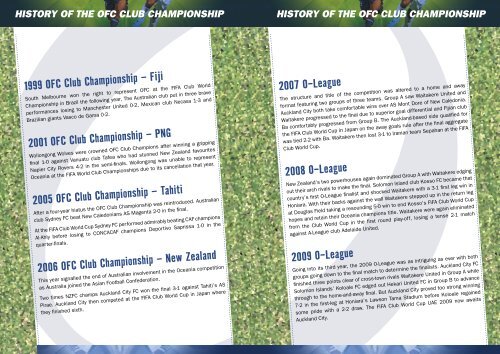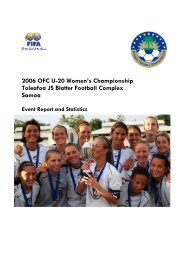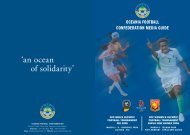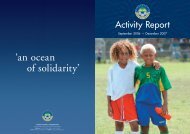You also want an ePaper? Increase the reach of your titles
YUMPU automatically turns print PDFs into web optimized ePapers that Google loves.
HISTORY OF THE OFC CLUB CHAMPIONSHIP<br />
1999 oFc club championship – Fiji<br />
South Melbourne won the right to represent OFC at the FIFA Club World<br />
Championship in Brazil the following year. The Australian club put in three brave<br />
performances losing to Manchester United 0-2, Mexican club Necaxa 1-3 and<br />
Brazilian giants Vasco de Gama 0-2.<br />
2001 oFc club championship – pNG<br />
Wollongong Wolves were crowned OFC Club Champions after winning a gripping<br />
final 1-0 against Vanuatu club Tafea who had stunned New Zealand favourites<br />
Napier City Rovers 4-2 in the semi-finals. Wollongong was unable to represent<br />
Oceania at the FIFA World Club Championships due to its cancellation that year.<br />
2005 oFc club championship – tahiti<br />
After a four-year hiatus the OFC Club Championship was reintroduced. Australian<br />
club Sydney FC beat New Caledonians AS Magenta 2-0 in the final.<br />
At the FIFA Club World Cup Sydney FC performed admirably beating CAF champions<br />
Al-Ahly before losing to CONCACAF champions Deportivo Saprissa 1-0 in the<br />
quarter-finals.<br />
2006 oFc club championship – New Zealand<br />
This year signalled the end of Australian involvement in the Oceania competition<br />
as Australia joined the Asian Football Confederation.<br />
Two times NZFC champs Auckland City FC won the final 3-1 against Tahiti’s AS<br />
Pirae. Auckland City then competed at the FIFA Club World Cup in Japan where<br />
they finished sixth.<br />
HISTORY OF THE OFC CLUB CHAMPIONSHIP<br />
2007 o-League<br />
The structure and title of the competition was altered to a home and away<br />
format featuring two groups of three teams. Group A saw Waitakere United and<br />
Auckland City both take comfortable wins over AS Mont Dore of New Caledonia.<br />
Waitakere progressed to the final due to superior goal differential and Fijian club<br />
Ba comfortably progressed from Group B. The Auckland-based side qualified for<br />
the FIFA Club World Cup in Japan on the away goals rule after the final aggregate<br />
was tied 2-2 with Ba. Waitakere then lost 3-1 to Iranian team Sepahan at the FIFA<br />
Club World Cup.<br />
2008 o-League<br />
New Zealand’s two powerhouses again dominated Group A with Waitakere edging<br />
out their arch rivals to make the final. Solomon Island club Kosso FC became that<br />
country’s first O-League finalist and shocked Waitakere with a 3-1 first leg win in<br />
Honiara. With their backs against the wall Waitakere stepped up in the return leg<br />
at Douglas Field taking a resounding 5-0 win to end Kosso’s FIFA Club World Cup<br />
hopes and retain their Oceania champions title. Waitakere were again eliminated<br />
from the Club World Cup in the first round play-off, losing a tense 2-1 match<br />
against A-League club Adelaide United.<br />
2009 o-League<br />
Going into its third year, the 2009 O-League was as intriguing as ever with both<br />
groups going down to the final match to determine the finalists. Auckland City FC<br />
finished three points clear of cross-town rivals Waitakere United in Group A while<br />
Solomon Islands’ Koloale FC edged out Hekari United FC in Group B to advance<br />
through to the home-and-away final. But Auckland City proved too strong winning<br />
7-2 in the first-leg at Honiara’s Lawson Tama Stadium before Koloale regained<br />
some pride with a 2-2 draw. The FIFA Club World Cup UAE 2009 now awaits<br />
Auckland City.





